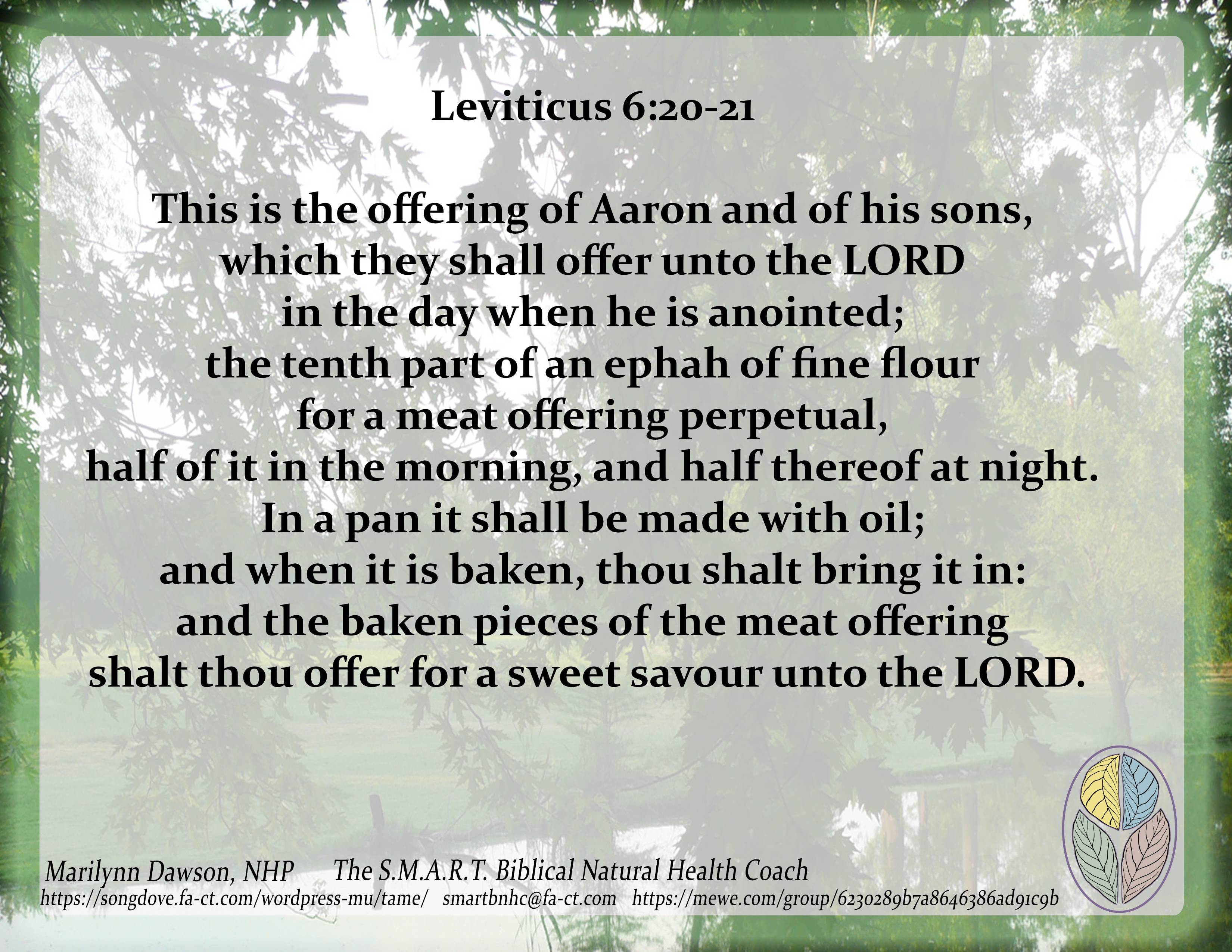This is the offering of Aaron and of his sons, which they shall offer unto the LORD in the day when he is anointed; the tenth part of an ephah of fine flour for a meat offering perpetual, half of it in the morning, and half thereof at night. In a pan it shall be made with oil; and when it is baken, thou shalt bring it in: and the baken pieces of the meat offering shalt thou offer for a sweet savour unto the LORD.
Leviticus 6:20-21
Here, the word "meat", refers to food in general, and the food being made here, is a flatbread recipe featuring fine flour and oil. The concept of coarse versus fine flour has been a reality since long before industrialization. Unfortunately, manual methods they uncovered in ancient Egypt and Rome, unearthed the reality that although fine flour was often reserved for royalty, such nobility often had poor teeth with etching reminiscent of bits of rock in the flour. Manual flour creation was done with stone grinding wheels, and it was common for some of that stone to get into the flour, the finer you ground it. I'm not sure what method of obtaining fine flour the Hebrews had, but fine flour was stipulated for this flatbread recipe for the Tabernacle.
In modern times, fine flour is considered "over-processed" because not only is it finely ground, but the husk and bran have been removed too, giving the white or slightly off-white appearance.
Leviticus 6:20-21
Here, the word "meat", refers to food in general, and the food being made here, is a flatbread recipe featuring fine flour and oil. The concept of coarse versus fine flour has been a reality since long before industrialization. Unfortunately, manual methods they uncovered in ancient Egypt and Rome, unearthed the reality that although fine flour was often reserved for royalty, such nobility often had poor teeth with etching reminiscent of bits of rock in the flour. Manual flour creation was done with stone grinding wheels, and it was common for some of that stone to get into the flour, the finer you ground it. I'm not sure what method of obtaining fine flour the Hebrews had, but fine flour was stipulated for this flatbread recipe for the Tabernacle.
In modern times, fine flour is considered "over-processed" because not only is it finely ground, but the husk and bran have been removed too, giving the white or slightly off-white appearance.
This is the offering of Aaron and of his sons, which they shall offer unto the LORD in the day when he is anointed; the tenth part of an ephah of fine flour for a meat offering perpetual, half of it in the morning, and half thereof at night. In a pan it shall be made with oil; and when it is baken, thou shalt bring it in: and the baken pieces of the meat offering shalt thou offer for a sweet savour unto the LORD.
Leviticus 6:20-21
Here, the word "meat", refers to food in general, and the food being made here, is a flatbread recipe featuring fine flour and oil. The concept of coarse versus fine flour has been a reality since long before industrialization. Unfortunately, manual methods they uncovered in ancient Egypt and Rome, unearthed the reality that although fine flour was often reserved for royalty, such nobility often had poor teeth with etching reminiscent of bits of rock in the flour. Manual flour creation was done with stone grinding wheels, and it was common for some of that stone to get into the flour, the finer you ground it. I'm not sure what method of obtaining fine flour the Hebrews had, but fine flour was stipulated for this flatbread recipe for the Tabernacle.
In modern times, fine flour is considered "over-processed" because not only is it finely ground, but the husk and bran have been removed too, giving the white or slightly off-white appearance.
This is the offering of Aaron and of his sons, which they shall offer unto the LORD in the day when he is anointed; the tenth part of an ephah of fine flour for a meat offering perpetual, half of it in the morning, and half thereof at night. In a pan it shall be made with oil; and when it is baken, thou shalt bring it in: and the baken pieces of the meat offering shalt thou offer for a sweet savour unto the LORD.
Leviticus 6:20-21
Leviticus 6:20-21
0 Comments
0 Shares
625 Views
0 Reviews



